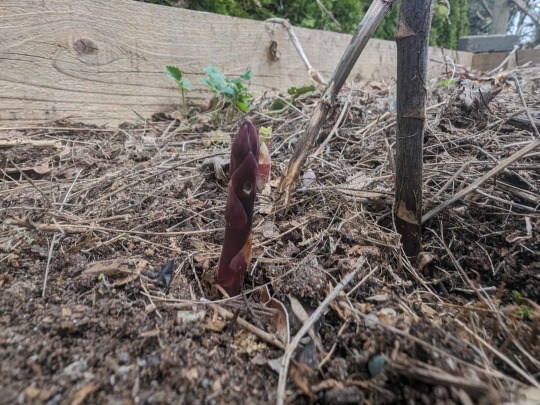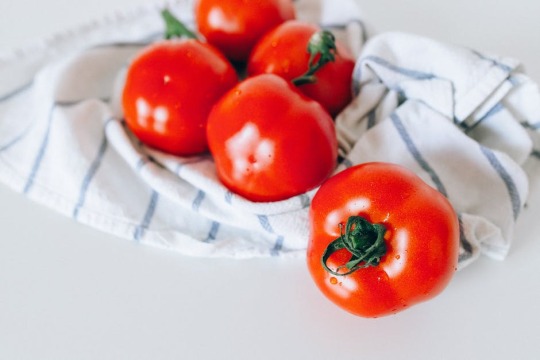#intercropped
Text
Oh fuck I need to order seeds
22 notes
·
View notes
Text
I called in sick today so I could muck around in the garden.

The sun came out at around 0900 and I like to think it was the universe telling me I made the right choice.
I found the first spears of asparagus pushing out of the ground. There were 3 fat fuzzy bumblebees going wild on pussywillow pollen. Last year's daikon and broccoli left seeds that are sprouting independently. I planted sitaw and cassoulet bean starts in the greenhouse. I staked the new cherry and pear tree branches so they'll grow en espalier. I told the 3 yr old peach tree that it's the prettiest princess in the yard and the ancient Asian pear that it was a fucking champion for having about 100 visible blossoms despite half its trunk rotting away. There was random garlic growing everywhere so I relocated them beside the strawberries for pest control and company. I apologized while viciously pruning the raspberries and swore at the asshole buttercups that keep invading the bee flower patch.
Now I'm finishing a negroni and eating leftover baked pasta. Self care is different for everyone. Mine looks like rolling around in dirt.
#home produce#i don't like to use homesteading#too much colonial baggage#and I come from a culture that had always grown their own food until the late 20th century shamed us away from that#anyway gardens are my happy place#indigenous farming techniques#permaculture#intercropping#solarpunk
26 notes
·
View notes
Link
2 notes
·
View notes
Text
[Blog]Intercropping In Indian Farming: Benefits and Examples @Kaybeebio

Intercropping is an agricultural practice, that involves cultivating two or more crops simultaneously in the same field, with careful consideration of their compatibility and growth habits. Unlike monoculture, where a single crop dominates the land, intercropping creates a diverse and harmonious ecosystem that can yield numerous benefits. Read all the benefits here at Kay Bee Bio Organics blog.
2 notes
·
View notes
Text
The Future of Sustainable Agriculture: Innovations and Best Practices
Agriculture is one of the largest industries in the world, providing food for billions of people. However, the current state of agriculture has a significant impact on the environment, from soil degradation to water pollution and loss of biodiversity. It is crucial for the future of our planet that we transition towards sustainable agriculture practices.
we will explore the latest innovations…

View On WordPress
#agroecology#agroforestry#best practices#biodiversity#biological control#climate change#conservation agriculture#crop rotation#ecosystem services#food production#government policies#habitat manipulation#individual action#integrated pest management#intercropping#land use#natural methods#organic agriculture#precision agriculture#regenerative agriculture#resistant crops#soil health#sustainable agriculture#sustainable future.#technology#vertical farming
2 notes
·
View notes
Text
#Crop Rotation and Intercropping: Sustainable Farming Practices#Benefits of Crop Rotation#Benefits of Intercropping#Crop Rotation and Intercropping
0 notes
Text
How Women in Meru Are Leading the Shift from Miraa to Banana Farming
“Explore how Banana Farming in Meru is transforming the local economy, empowering women farmers, and creating new opportunities in Kenya’s agricultural sector.”
“Discover the rise of Banana Farming in Meru, where women are leading a new agricultural revolution, boosting incomes and revitalizing rural communities.”
“Learn about the challenges and opportunities in Banana Farming in Meru, as the…
#Banana Farming in Meru#banana farming opportunities#banana production Kenya#challenges in banana farming#economic impact of banana farming#government support for banana farmers.#intercropping bananas in Meru#Meru agriculture#Meru banana value chain#Meru commercial centers#Meru rural economy#women farmers in Meru
1 note
·
View note
Text
Garden Activities for April Part 2
Collecting Seeds and dry wood
The hot, dry weather allows seeds to dry naturally. We must carefully collect tree tomato and tomatillo seeds from the fruit pulp before they dry. However, there’s always a risk of seed pods opening or dropping to the ground and starting to germinate. We harvest the dry seed pods and store them for the future, ensuring they are dry enough to prevent mould…

View On WordPress
0 notes
Link
https://marmikmaharashtra.com/cannabis-farming-at-moody-intercrops-taken-in-turis-field-91-thousand-728-rupees-seized/
0 notes
Text
Episode 5 of Gardening with H where I give a brief introduction to intercropping.
#intercropping#tomatoes#beans#companion planting#gardening#gardening with H#plants that can share a space
1 note
·
View note
Text
Today we sowed some white clover, breadseed poppies, and various other flowers which will provide habitat for native bees and other beneficial insects. One thing I'm trying differently from last time is instead of sowing them at the same time, I waited until the food crops had sprouted to sow them. This I think will give the food crops a head start, and help them to not be out competed significantly by the clovers and other living mulches.
1 note
·
View note
Text
Decided i want to do something re: biodiversity and ecostystems, probably either conservation or rewilding or sustainable agriculture
1 note
·
View note
Link
1 note
·
View note
Text
data about where carbon emissions are coming from is so frustrating cause there's all kinds of huge, sprawling, just fucking vast breakdowns of What Causes The Most Carbon Emissions Out Of All Everything In The Entire World, but those are aggregations of numerous smaller but still vast aggregations of data, which are processed and polished from various aggregations of crunched numbers, which are patched and pieced together from various studies, estimates and calculations, which are sieved out of numbers crunched from various measurements, estimates and records, which have been collected, estimated or otherwise conceived through an unspeakably huge variety of methodologies with unspeakably huge variety in limitations, reliability and margins of error.
Even if some of the data was very fine-grained at the beginning, it was filtered through some very coarse number-crunching techniques for the sake of the coarse data, so the results are only as good as the wrongest thing you did in any part of this process, but the plans of action are getting thought up from the top down, which makes the whole thing a hot fucking mess.
For example. And I just made this example up. Say you want to know whether apples or potatoes have a worse impact on climate change. So you look at one of these huge ass infographic things. And it says that potatoes are bad, whereas apples are REALLY good, the BEST crop actually. So it's better to eat apples than potatoes, you think to yourself. Actually we should find a way to replace potatoes with apples! We should fund genetic engineering of apples so they have more starch and can replace potatoes. Great idea. Time to get some investors to put $5 billion towards it.
But actually. Where'd they get that conclusion about apples? Well there's this review right here of the carbon footprint of all different fruits, seems legit. Where'd that data come from? Well it's citing this study right here saying that tree-grown crops are better because they sequester carbon, and this study right here about the distance that different fruits get transported, and this study right here where different fertilization systems are compared in terms of their carbon footprint, and this study over here that sampled 300 apple, peach, and orange farmers comparing their irrigation practices and rates of tree mortality, and this study...wow, okay, seems really reliable...
...what's the first study citing? oh, okay, here's a study about mycorrhizal networks in orchards in Oregon, saying that there's a super high density of fungal mycelium in the 16 orchards that they sampled. And here's a study about leaf litter decay rates in Switzerland under different pesticide regimes, and...okay...relationship of tree spacing to below ground vs. aboveground biomass...a review of above and below-ground biomass in semi-intensively managed orchard plots...
...That one cites "Relationship between biomass and CO2 requirements...carbon immobilization in soil of various tree species...mycorrhizal fungi impact on carbon storage...
...wait a second, none of these are talking about apples, they're about boreal forests...and orange trees...and peanut farms! They're just speculating on roughly applying the non-apple data to apples. You have to go backwards...
Yes! "A review of belowground carbon storage in orchard cropping systems!" Seems like overall the studies find potentially high carbon storage in orchard environments! Walnuts...pears...oranges... intercropping walnuts and wheat... intercropping apples and wheat... wait a second, what about orchards with only apples?
Time for you to go back again...
"New method of mulching in apple orchards can lower irrigation and pesticide needs..." okay but if it's new, most farmers aren't doing it. "Orchards with high density interplanted with annual crops show way more mycorrhizal fungus activity..." "Mycorrhizal associations with trees in the genus Malus..."
...And pretty soon you've spent Five Fucking Hours investigating apples and you've got yourself in this tangled web of citations that demonstrate that some orchard crops (not necessarily apples) store a lot of long-lasting biomass in their trunks and roots really well—and some apple orchards (not necessarily typical ones) have high amounts of mycorrhizal fungi—and some techniques of mulching in orchards (not necessarily the ones apple farmers use) experience less erosion—and some apple trees (not necessarily productive agricultural apples) have really deep root systems—
—and some environments with trees, compared with some conventional agricultural fields, store more carbon and experience less erosion, but not apple orchards because that data wasn't collected in apple orchards.
And you figure out eventually that there is no direct evidence anywhere in the inputs that singles out apples as The Best Crop For Fighting Climate Change, or suggests that conventional apple farming has a much smaller carbon footprint than anything else.
The data just spit out "apples" after an unholy writhing mass of Processes that involved 1) observing some tree-grown crops and deciding it applies closely enough to all tree grown crops 2) observing some apple orchards and deciding its applicable enough to all apple orchards 3) observing some tree-including environments and deciding its close enough to all tree-including environments 4) observing some farming methods and deciding it applies closely enough to all farming methods
And any one of these steps individually would be fine and totally unavoidable, but when strung together repeatedly they distort the original data into A Puddle of Goo.
And it wouldn't be that bad even to string them together, if trees didn't vary that much, and farming didn't vary that much, and soil didn't vary that much, and mycorrhizal networks didn't vary that much, and regions that grow apples didn't vary that much, and pre-conversion-to-apple-orchard states of apple orchards didn't vary that much, and economic incentives controlling apple farming didn't vary that much, but all of these things DO vary, a Fuck Ton, and if the full range of variation were taken into account—nay, intentionally optimized—the distinction between apples and potatoes might turn out to be be MEANINGLESS GOO.
anyway big size piles of data about Farming, In General, make me so bitchy
1K notes
·
View notes
Text
Advantages of intercropping
A farming practice known as intercropping involves growing two or more crops concurrently in the same field. This custom has been used for centuries and has been shown to be advantageous for both farmers and the environment. Farmers all over the world have embraced intercropping because of its many advantages, which include higher yields, soil conservation, pest control, and resource efficiency.

Read more
0 notes